Occupy Being Occupied
The tents at Occupy Wall Street are increasingly housing the homeless.
Many of us have predicted that, as the weather cools off, so will the Occupy Wall Street protests–at least the occupying part. It appears to be happening.
It’s cooled off considerably in the DC area over the last week or so, with a couple of overnight freezes. So I was actually rather surprised to see just as many tents as before as I drove by the McPherson Square encampment of Occupy DC over the last week.
Last night, though, I had occasion to walk through it on my way back to the car from an event and virtually everyone I saw appeared to my semi-trained eye to be representatives of DC’s homeless population rather than bright-eyed 20-somethings. It was a vastly different group of people than I saw just last Thursday night–and it was at least an hour earlier last night, so less likely that the protestors would have turned in.
This isn’t hippy punching, just a predictable outcome of human behavior. It’s one thing to spend a couple weeks camping out to show solidarity for a cause. It’s quite another to do it in miserable, even dangerous conditions. The only time I’ve ever done it I was in the Army and there was a war on.
OTB Roving Correspondent Richard Gardner passes on word that the same thing has happened in the other Washington, where it’s a wee bit cooler. A Tacoma News Tribune report from over the weekend is headlined “100-tent Occupy Olympia has become haven for homeless.”
To the outside world, Occupy Olympia is a two-week-old political protest designed to make a point – spotlighting the growing income disparity of 1 percent of the wealthiest compared with everyone else. But inside the village of about 100 tents, the camp has taken on another role, serving as a harbor for the poor and homeless, a place to get food and shelter and connect with social services.
Camp resident Audrey Daye told the Olympia City Council this week that the camp is “probably at this point two-thirds houseless community members and one-third combination of young activists and older progressives.” She has been staying there with her husband, Alex, and two children.
Mary Spokane, another camp resident, told the Olympia City Council on Tuesday that the state agreeing to open restrooms 24 hours a day “is what attracted many homeless to our camp.” She estimated 50 homeless people have come in. ”There’s an equality that’s happening,” she said. “There’s immense love that’s happening.”
Steve Valandra, spokesman for state Enterprise Services, said the camp is allowed there as an expression of free speech. But the rules might change if it is deemed a homeless encampment, he said. ”It’s not meant to be a homeless camp,” he said. “It’s not meant to be a place for people to have all the amenities of home.”
Leaving aside from the jarring juxtaposition of the views of the Occupy folks and the state employees, this is just a natural evolution. The homeless have no choice but to sleep outside in the cold; not so much most of the protestors. It’s apparently happening all over. Adam Nagourney for the NYT:
From Los Angeles to Wall Street, from Denver to Boston, homeless men and women have joined the protesters in large numbers, or at least have settled in beside them for the night. While the economic deprivation they suffer might symbolize the grievance at the heart of this protest, they have come less for the cause than for what they almost invariably describe as an easier existence. There is food, as well as bathrooms, safety, company and lots of activity to allow them to pass away their days.
“When the tents went up, everybody moved in,” Douglas Marra, a homeless person in Denver, said. “They knew they could get stuff for free.”
But their presence is posing a mounting quandary for protesters and the authorities, and divisions have arisen among protesters across the country about how much, if at all, to embrace the interlopers. The rising number of homeless, many of them suffering from mental disorders, has made it easier for Occupy’s opponents to belittle the movement as vagrant and lawless and has raised the pressure on municipal authorities to crack down.
In Atlanta on Saturday, demonstrators who had been thrown out of Woodruff Park by the police moved into upper floors of the Peachtree-Pine homeless shelter in a full-scale embrace of the cause of the 600 residents who live below them. It gave the demonstration more of a political focus, and not incidentally expanded its size.
“The homeless bring numbers,” said Alex Smith Jr., 50, a former repairman who lives at the shelter and joined the protests. “They bring a voice.”
But in places like Nashville, New York, Los Angeles and Oakland, Calif., protesters talk about feeling unsafe because of the presence of homeless people.
“There are a lot of them here that have mental problems and that need help. They are in the wrong place,” said Jessica Anderson, 22, who is herself homeless, sitting with friends on a tarp at the Los Angeles site. “They have been creating more problems. There was one guy who showed up last night and he would not shut up: Saying all kinds of crazy stuff all night.”
In Nashville, organizers described the homeless as more of a detriment to the movement than an asset. “This is keeping people away: It distracts a lot of energy away from the issues we’re fighting for when we’re just managing life in the camp,” said Bob Titley 56, one of the participants in Occupy Nashville. “A lot of women felt unsafe camping out at night. It discourages a lot of people from participating.”
The influx of homeless has been continuing at a steady pace, even as the overall populations of some of the demonstrations have faded under the pressures of dropping temperatures, the passage of time and increasingly aggressive police tactics. Some organizers estimated that as many as 30 percent of the people camping out in some cities were chronically homeless, a figure that seems impossible to verify.
There’s some predictable schadenfreude on the part of some on the right about the irony of a protest movement that has annoyed the residents of some in the impacted communities now having to contend with some of the same issues. Then again, as Glenn Wright notes, there’s a more tragic irony at work here:
If you want to understand one acute irony of the current Occupy Wall Street and other occupation protests going on around the nation, you have to consider that the real permanent occupation protests against inequality have had little impact—i.e. the protests represented by America’s homeless population.
Widely hated by people who find the homeless dangerous or at best a blight against business, homelessness is a constant reminder that the USA has another 1%—the people who are economically the worst off in the nation. Many of these people are homeless, although the USA as a nation keeps no accurate figures on the number of homeless people.
[…]
Increasingly, homeless people are recognizing that they have every right to be included in the occupation protests such as Occupy Wall Street. Media reports have often attempted to depict basic divisions between the occupiers and the homeless, quoting OWS protesters, for example, as wanting to distinguish themselves and their aims from what have been described as the “professional homeless”.
The latter label, describing homeless people skilled at surviving on the streets, has been used to suggest that many of the occupations were infiltrated by people looking only for a meal and a safe place to sleep—as if such a need disqualified someone from making a valid protest against economic inequality.
However, more and more, the occupation movement has come to realize an essential link between the aims of the movement, and the permanent and difficult existence of America’s homeless, who are the most explicit example of the human cost of inequality in the USA.
Homelessness is a more complex issue than mere economic inequality. A remarkable number of the population are mentally ill or addicted to drugs or alcohol and we simply have a failed system at dealing with those issues, to the extent we deal with them at all.
The “occupy” part of the Occupy movement has served its purpose, likely beyond the expectations of the organizers. It became a national and international sensation and helped bring a conversation that was happening on the sidelines front and center.
Apparently, they’re already abandoning their campouts in droves, along with their tents. Which I’m sure the homeless appreciate. Now it’s time for the protestors to figure out a new way to keep the conversation going and, hopefully, help direct it to something beyond talk.
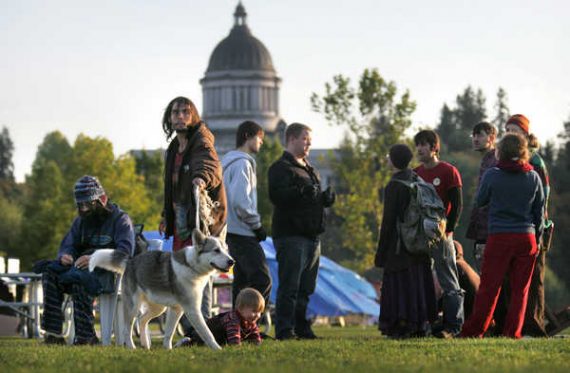

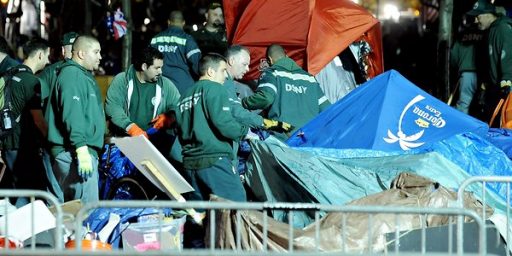

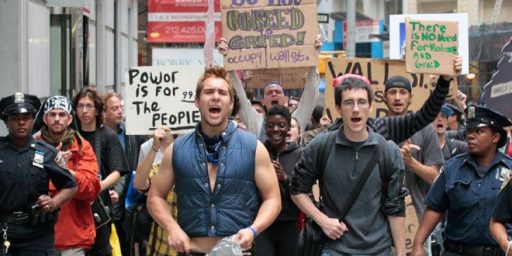
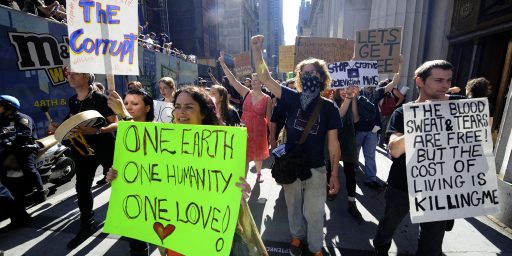
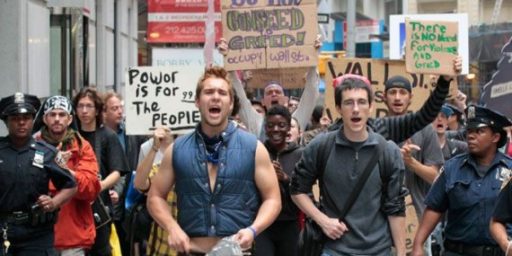
Yeah, but will these kids be able even to grasp the irony? I don’t think so. As stated previously if Generation Y was a stock I’d short sell it.
It’ll be interesting to see if the cities who allowed the occupy protests to camp in city squares will continue to do so when its mainly true homeless. I’d guess not, and that probably says it all about the difference between the OWS and the real poor; the OWS has political clout because its mainly middle class, and at least in theory represents a lot of people, many of which vote. The homeless of course are a much smaller group, and I’d guess don’t vote.
I don’t think many of the reforms the OWS is hoping for (many of which I think are long overdue) would have any impact on the bottom 1%, and I doubt many of the OWS would think that important – they’re as far from that bottom 1% as they are from the top 1%. Not a criticism, just the way it is. Class identity has always existed all the way up, its not imposed from the top.
(Speaking as someone who still frequently goes to Zucotti in NYC)
The homeless haven’t really infiltrated OWS here, from my personal observation. Naturally, I can’t speak for other cities, but there is a very strict no-drugs policy here, even posted on the by-laws on one of the walls at Zucotti. I have no proof, but I suspect that is what has driven a lot of homeless folk from the site.
And again, I can’t speak for other cities, but Zucotti is surprisingly organized; a lending library with its own rules has sprung up, there are marked first aid/food/comfort stations, and each tent is clearly marked with number of occupants. I suppose the sheer cramped space of Zucotti might also be contributing to this lack of infiltration.
@george: Camping out overnight in public spaces is generally illegal. Decision-makers have, wisely I think, made an exception for peaceful protestors. Scary vagrants, some unknown number of whom are actually a danger to themselves and others are simply different.
@Peacewood: That wouldn’t shock me. Zuccoti is ground zero for the protests, whereas the others are much smaller spinoffs. Still, I’d be shocked if OWS is still going strong a month from now even there.
Funny how there is no money for schools and no money for Medicaid, but there are hundreds of billions for corporate welfare. It also seems that are lot of these poor, oppressed corporations that are being held back by high taxes don’t actually pay them…
http://www.sfgate.com/cgi-bin/article.cgi?f=/c/a/2011/11/04/BUCN1LQ5IK.DTL&tsp=1
Do you think the problem of mentally ill homeless will improve when Republicans finish destroying the safety net?
A fair piece, again, JJ.
Of course if we pursued Republican goals we’d have a very different population of homeless: far more ‘regular’ folk driven to begging in the streets as the safety net is obliterated, far more sick and dying folk who can’t get medical care, far more undocumented folk unable to rent despite working.
Agreed, a fair piece.
Although my local Occupy doesn’t have any significant percentage of homeless, it seems obvious to me that the tactic of occupation will run its course, when it stops serving its purpose of provoking discussion among the general population.
This is why I am advocating that we pivot to other tactics, such as the Wall Street Bank disinvestment strategy of moving money to community banks and credit unions, and linking up with labor unions to fight privatization schemes in cities and states.
The lunch counter protests died away when they served their purpose, and were replaced by other even more effective tactics. So will Occupy.
Oh, and yes, lets discuss the Republican or conservative plans for how to help the homeless.
Please, direct me to a proposal or think tank piece that sincerely attempts to make the lives of the homeless less miserable.
I like the Glenn \ Wright piece, and think that many do grab the wrong end of the irony. (Put that down, if you don’t know how to use it.)
@anjin-san: @michael reynolds: I don’t know what percentage of the homeless are regular folks down on their luck versus mentally ill and drug addicts. Presumably, the percentage is up. But homelessness because a problem, generally speaking, when the courts declared that we could no longer force people unable to take care of themselves to stop living with no visible means of support.
I don’t want to go back to the days where the authorities could just lock people up in mental institutions without serious due process. But we’ve gone too far in the other direction and our big cities are now rife with vagrants, panhandlers, and crazies occupying our sidewalks and park benches. It’s just horrible for all concerned.
@michael reynolds:
Totally agree
…The sad thing is that far too many commentators read “fair” as “liberal” and further proof that OTB and James continues on the slipperly slope slide into MSNBC.
@James Joyner:
I think that some of the homeless here have roots in the old “beachcomber” days. With warm weather you can live by the beach with very little. Some are mad, but some try to fly under the radar (with a deferential “good morning sir” when they see you).
I’d really like to know what could be done for them. I think Mao would have just round them up and sent them to the countryside. I’ve always wondered if there was a humane version of that possible. 3 hots and a cot for simple (and obviously less productive) farm work? I don’t know.
@john personna: I can understand being a beach bum in LA. Not for me, of course, but the appeal is obvious. Sleeping on a concrete sidewalk in an urban center with people constantly walking by? Not so much.
@ James
Roughly half the homeless suffer from some degree of mental illness. Chemical dependency is a mental illness.
@john personna: 3 hots and a cot for simple (and obviously less productive) farm work? I don’t know.
Ah, the urbanists answer. Move the problem onto others outside their urbanista utopia. But there were places that did exactly what you indicate. But the country work farms are a thing of the past in all but the remotest areas. And is would require a work farm to keep the urban homeless on the farm. Especially, given modern farm work requires skills, the use of expensive equipment and a diligence to improve yields and not damage fields. Might be better to assign some of the urban garden space to the homeless where they can tend gardens.
But this occupation of the occupation does indicate one inevitable outcome. Force will be required to remove these camps even after the rich kids have returned to their daddy’s McMansion. At some point, Bloomberg and others will send the police in with clubs and tear gas to move the “professional” homeless back into the recesses. I don’t see how it can happen differently now. The only question is, will they riot. Will the hardcore anarchists try to incite the homeless?
@JKB:
Aren’t some states authentically depopulating?
The alternative, that homeless increasingly live on the stoops is a little Victorian for me.
@john personna:
Well, if you are going to transport them to live in barracks far from social services, that seems a little Maoist to me. When you could build the barracks right in town next to the social services building with the hospital and jail nearby. Otherwise, how do you expect them to make the 30, 50, 100 mile trek to the “city” for services and to buy supplies?
Now, if you have homeless people yearning to do some subsistence framing out on the prairie, living in a sod house, living as Africans do tilling the soil by muscle power in a great sustainable experiment, then by all means, look for a charity who will set that up. Sierra club has a lot of cash, maybe some AGW movement?
@JKB:
I think you are building a complete little failure plan there. (in the 1st paragraph)
I was only suggesting that the offer of “3 hots and a cot” would draw some of the homeless, and would form a sort of last chance safety net. Obviously there are issues how even that kind of voluntary option would be policed. Shrug. Legalize pot and let them mellow. (similar to the second, but no bizarre need to put it on the Sierra Club, of all people.)
When Ronald Reagan as Governor of California signed the law de-institutionalizing the mental hospitals, liberals of the day cheered, preferring to house the mentally ill in community halfway houses for counseling and reintegration into society.
Of course, the funding for the halfway houses never materialized, and the mentally ill were discharged from the warehouses of mental hospitals to the streets.
Were we a nation motivated by Christian ethics, we would fund the hospitals and clinics necessary to house and treat the ill.
But that would cost something on the order of a latte per person and, as has been pointed out by so many, that is intolerable.
@Liberty60:
Sorry, separation of church and state. Can’t be a nation motivated by Christian ethics, Christian charity or even the lessons of Christ as example.
And the new post-modernism we are to live by tells me, unless I feel like paying to house and treat the mentally ill, I don’t have an obligation.
Oops, I guess they didn’t apply enough critical thinking when it was decided to go after America as a Christian nation.
As has been mentioned, a high percentage of these people have mental and physical problems, dependencies and addictions, no family support, and no help at all. I remember a few years ago in Pennsylvania Gov. Rendel closed a large mental asylum that was still operating and serving very well. Why he did that, I don’t know. There was something about the facility being very old, but it could have been fixed up, modernized and kept going. There was supposed to be other agencies to take these people, but that did not happen. Most fell through the cracks. Then in 2008 was the trillion dollar bailouts and later another trillion dollar stimulus. Just a fraction of that money could have brought help to these people so that they are not out on the streets. While most are harmless, a few are dangerous to others and themselves. Many churches are still spending on larger buildings and facilities that stand empty and unused 90% of the week. And of course, most people do not want a facility, group home, treatment center, methadone clinic. or asylum in their neighborhood, including me. Perhaps some vacant mills, factories, or even military bases could be put to use as a solution, but you still have to refit and have the personnel. States are broke: laying off workers, cutting budgets, closing schools, and desperate to find new revenues. This is the result of unfunded Federal mandates, years of unfunded wars, tax cuts, unlimited government spending, fraud and waste, and welfare. During the “War on Poverty”, poverty has actually increased. A total failure and flop of big government and socialism.
@JKB
Yes. We liberals tend to forget the conservative creed. Invoke the name of Jesus every 15 minutes. Never, never ever follow his actual teachings.
@anjin-san:
Funny when I was down on the Gulf coast after Katrina, I met church and Christian groups time and again who’d put their lives on hold to drive 100s of miles to offer hand, provide some cooked food, haul stuff to the road for people whose house was flooded, etc. But never did I see one, liberal, community organizer group. Of course, I wasn’t in New Orleans where the cameras were, I was in Mississippi where the real damage occurred but the “assistance” didn’t lend itself to the media or liberal agenda.
@JKB
I guess you will say pretty much anything to support your argument, and actual principles have nothing to do with it. Hence the raging contrdictions in your last few posts.
And of course, you can tell if someone is a liberal on sight. And of course, it is impossible for people in a church group to be liberals.
God gave us brains because he wants us to think. You should try it sometime.
Clearly, we can employ Christian principles, any time we want to. The wisdom of the founding fathers, which you seem to have a problem with, does not prevent this. I am not a Christian, but I do try to use the teaching of Jesus in my life, simply because it is wise and good. There are a number of other Christian principles I hold in high regard. That horrible, awful liberal post modernism does not hold me back in the slightest.
@JKB:
As it happens, genius, I drove down myself. I was living in NC and decided to hop in my wife’s SUV and drove down south, got as far as Meridian, Mississippi. I’d have gone further but gas was in short supply, hotels not open, etc…
In Meridian I offered help to a couple of shelters, many in a state of some chaos. I finally found one shelter where I walked in and said “What do you need?” and a guy actually was prepared with a list. So I ran off to Wal-Mart, spent some money, came back with his list of supplies.
The shelter was run by the Red Cross and Wal-Mart was — I swear to god — marking down prices while the streets were still choked with downed trees.
I’m a liberal and an atheist.
Good. Sounds like the occupy movement is actually providing a useful service.